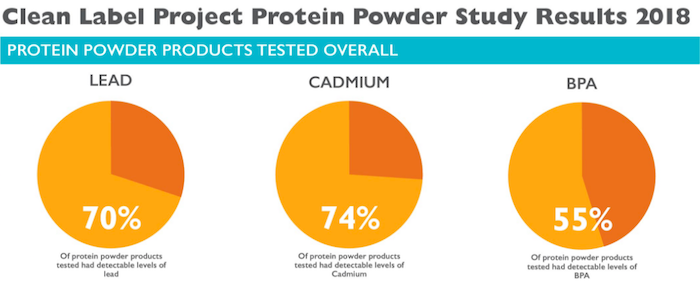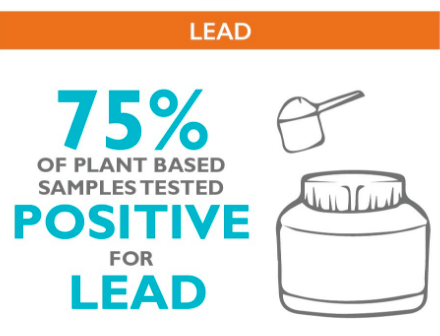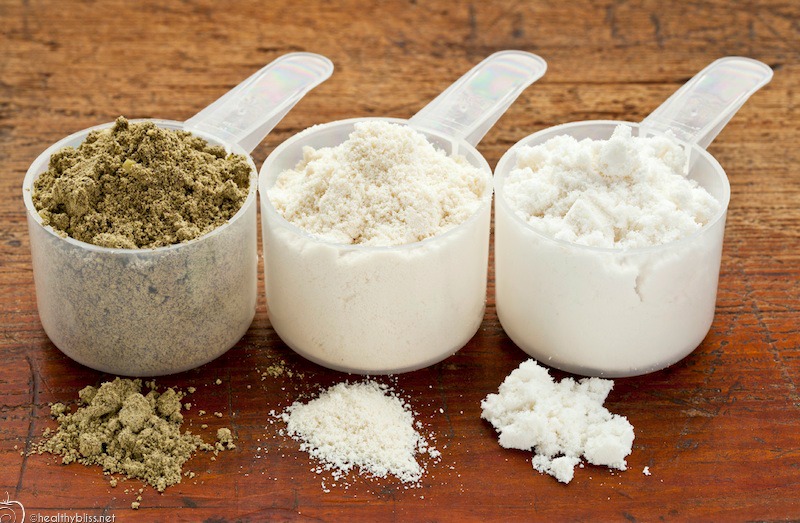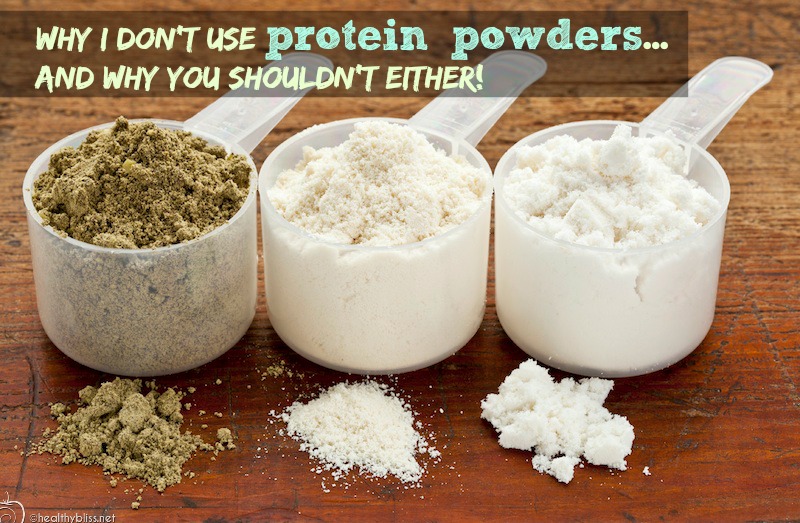Protein Powders containing Mercury, Lead, Arsenic and Cadmium: WARNING!
A new study has revealed that even ORGANIC protein powders can contain high amounts of dangerous heavy metals. The Clean Label Project recently tested 134 of America’s best selling animal-derived and plant-based protein powders for heavy metals, pesticides, BPA/BPS, residual solvents, mycotoxins, melamine and antibiotics residues.
Check below for the WHOLE FOODS I recommend to eat for protein.
All information in this article is for educational purposes only.
It is not for the diagnosis, treatment, prescription or cure of any disease or health condition.

Source: Clean Label Project 2018
In the study, many popular and 100% certified organic protein powders showed concerning levels of heavy metals such as arsenic, cadmium, mercury, and lead, and toxins like bisphenol A (BPA), a chemical found in some plastic containers and food can liners and a known endocrine disruptor.
These contaminants have been linked to cancer, brain damage, and reproductive issues.
The 2018 study by the Denver-based Clean Label Project, a nonprofit organization, found that virtually ALL of the 134 products tested contained detectable levels of at least one heavy metal and 55% tested positive for BPA.
MORE heavy metals in Organic Protein Powders vs. Non-Organic
Buying a product with an “organic” label did NOT reduce the chances of getting a contaminated product. In fact, organic protein supplements had higher levels of heavy metals, on average, than nonorganic. How can it be?

Source: Clean Label Project 2018
“That probably has more to do with these products being plant-based than being organic,” says Sean Callan, Ph.D., a neuroscientist and director of operations at the lab that tested the protein products.
Callan further states, “Plant-based proteins may have higher contamination levels because the plants are especially prone to absorbing heavy metals from soil.”
That last sentence may be a shocker, but I believe this is just the beginning of much more to come. I’ve been seeing it more and more and more in recent years. The process of getting certified organic does NOT include testing of the soil for heavy metals. People are switching to plant-based diets and getting sicker than they ever were before, with new ailments ranging from chronic fatigue to knee/joint/back/neck pain to kidney problems to general malaise to peripheral neuropathy and even symptoms of auto-immune disease. Many people blame themselves and their former SAD diet, thinking that they must be having some kind of detox reaction or Herxheimer reaction to eating such a clean diet. However, the new plant-based organic diet may not be as clean as you think. I recently wrote an article called What are the Symptoms of Heavy Metal Toxicity to try to explain this exact problem.
Plant-based Protein Powders HIGHER in heavy metals
Products made from plant-based sources of protein such as soy or hemp fared worse than those made from whey (milk) or egg, containing on average twice as much lead and measurably higher amounts of other contaminants.

Source: Clean Label Project 2018
Knowing that SEVENTY-FIVE PERCENT of plant-based protein powders tested came up positive for lead should be VERY alarming. In addition to lead, several plant powders contained mercury, cadmium and arsenic above health-based guidelines.
The 5 products that received the poorest overall scores in this study were:
- Garden of Life Organic Shake & Meal Replacement Chocolate Cacao Raw Organic Meal
- Nature’s Best Isopure Creamy Vanilla Zero Carb
- Quest Chocolate Milkshake Protein Powder
- 360Cut Performance Supplements 360PRO Whey Chocolate Silk Premium Whey Protein
- Vega Sport Plant-Based Vanilla Performance Protein
Symptoms of Heavy Metal Toxicity
To better understand what common symptoms of heavy metals toxicity correspond to each toxic heavy metal, I did some research from the Agency for Toxic Substances & Diseases Registry and the Centers for Disease Control and Prevention (CDC). Check out the list below showing each health symptom. Can you see how the results from this study on protein powders could be just the tip of the iceberg?
Symptoms of Heavy Metal Toxicity
- Foggy Brain – arsenic, lead
- Fatigue (extreme and/or chronic) – arsenic, lead
- Hair loss – thallium
- Memory loss – lead, aluminum
- Chronically bloodshot eyes – arsenic
- Mee’s lines (deep ridges on fingernails and/or toenails) – arsenic
- Impaired concentration – thallium, lead, aluminum
- Impaired motor function, sensory function, and cognitive function – aluminum
- Increased nervousness – thallium, lead
- Irritability – thallium, lead
- Dizziness – lead
- Depression/mood changes, headache – lead
- Skin discoloration – darkening (hyper pigmentation) – arsenic
- Hyperkeratosis (most frequently on the palms and soles) – arsenic
- Throat irritation / difficultly swallowing / chronic sore throat – arsenic
- Impaired immune system – lead, arsenic
- Generalized muscle aches, weakness and body pains – lead
- Muscle cramps or muscle tenderness – arsenic
- Numbness, tingling and pain (sensory) – arsenic
- Spontaneous pain – arsenic
- Localized edema – arsenic
- Inflammation or pain in the gastrointestinal (GI) tract – thallium, arsenic
- Decreased libido – lead, arsenic
- Decreased sperm count – lead, arsenic
- Infertility – lead, arsenic
- Peripheral neuropathy (hot or burning feeling in hands and feet) – arsenic
- Attention deficit hyperactivity disorder (ADHD) – lead
- Enlarged liver (hepatomegaly) – arsenic
- Hemolytic anemia – lead
- Nausea or diarrhea – arsenic
- Low Vitamin D levels (inability to convert Vitamin D) – lead
- Severe osteoporosis and osteomalacia – cadmium
- Proteinuria (too much protein in the urine) – arsenic
- Cardiac Arrhythmias (abnormal heart rhythms) – arsenic
- Skin cancer – arsenic
- Impaired lung function / fibrosis – aluminum
- Lung cancer – cadmium, arsenic
- Kidney (renal) failure – arsenic, cadmium, lead
- Gout – lead
- Kidney cancer – arsenic
- Bladder cancer – arsenic
- Liver cancer – arsenic
- Prostate cancer – arsenic
-from the Agency for Toxic Substances & Diseases Registry & the Centers for Disease Control and Prevention (CDC)

There is often a combination of deficiency, toxicity and damaged gut microbiome – all of which creates the “perfect storm” of ill health. Read more about this in my article Symptoms of Heavy Metal Toxicity.
What Protein Powders should you use?
Sorry to say, but my answer is: NONE. While this study shows that there are LESS contaminants in whey and egg-based protein powders (due to perhaps the animal being able to absorb or diffuse some of the toxins into their bone, hence why I think bone broth is another disaster), they are NOT coming up clean either. Further, any non-organic animal-based protein powder will have animals that are fed genetically modified feed, thus creating another problem which is pesticide toxicity.
If all of this is not a sign to STOP using protein powders, then I don’t know what is. For years, I’ve repeatedly been recommending to not use protein powders. Extracting protein from whole food, stripping the fiber and creating volatile and unpredictable powders that do not exist in nature is NOT natural or organic. You cannot create protein powders in your home. It needs to be done in a laboratory using extracting chemical solvents – such as hexane – and industrial laboratory equipment. Often times, residual solvents remain in the food product. And if that wasn’t enough, concentrated and extracted or hydrolyzed proteins are often high in glutamates and can cause reactions in people who are glutamate sensitive.
Animals in nature do not use protein powders and they are not lacking in muscle mass.
If you’re new to all of this information, then you’re head might be spinning and you may think I’m just some kind-of conspiracy theorist. It’s ok to think that! But, I’m not; I’m just a realist. This is the new reality we are facing today. We’ve over-populated the planet with people, trash, chemicals and toxins…and it’s now coming back through the soil, air and water. It’s a closed system and has reached its limits. We’ve over-filled every landfill, contaminated the oceans and damaged too much of the earth. Perhaps it’s karma coming to get us…I don’t know…but I do know this: NOW is the time to grow your own organic food. Getting back to permaculture & organic farming where crops are rotated, soil is replenished and water is clean…while these may seem like ways of the past, they’re the only real solution to a healthy future. Outside of that, I would definitely recommend a regular yearly detox protocol involving liver, kidneys, colon and heavy metal cleansing – at the very least.
What CAN you eat for protein?
Keep in mind that you may not actually need as much protein as you think. The US market for sports nutrition, energy/nutrition bars and sports drinks is set to exceed $20 BILLION by 2020, according to Euromonitor International.
Huge amounts of money are at stake.
There are diets created and promoted by the very industries (think Paleo, Dukan or Keto diet) that would like nothing more than for you to think that the only way to lose weight or increase muscle is to have generous amounts of their protein powder every day. This protein powder study is scaring the bejesus out of the big players in that honey pot. I’m already seeing major damage control happening – denial and downplaying the severity of these findings – in the comments in forums and on social media (and probably here too).
Back to what you CAN eat…
Good whole food plant sources of protein include chickpeas, black beans, lentils, seeds, nuts, and dark leafy green vegetables.
Examples of plants and their protein:
- 164g chickpeas = 14.53g protein
- 118g pumpkin seeds = 35.21g protein
- 143g almonds = 30.34g protein
- 140g sunflower seeds = 29.09g protein
How to eat whole food plant proteins?
- Enjoy delicious homemade seed crackers (and you don’t even need a dehydrator).
- Make your own hummus and eat a whole bowl of it, especially if you are looking for high protein in one meal.
- Add homemade tahini dressing to a generous serving of fresh veggie and cooked quinoa (quinoa is a complete protein).
- Include pumpkin seed cheese into your daily menu as a snack with freshly chopped apples or veggies.
- Blend a yummy Green Smoothie with added ingredients such as spirulina, sesame seed, tahini, almonds or pumpkin seeds.
Can you imagine a wild pony sitting on a mountaintop saying to a wild horse, “Where do you get your protein? I was feeling a bit tired going up that hill today, and your muscles look way bigger than mine. Whatever powder you are taking, I want it too!”
Of course that sounds ridiculous, because it is. Wild animals don’t need extra protein, but they also don’t ingest refined sugar, bread, fried foods, processed foods, coffee or alcohol either. And if they do, like a domesticated dog for example, they start to get the same metabolic diseases than humans suffer from.
Our human-created diet has created human diseases.
How much protein more or less is not the answer or the secret key to health. Getting more natural, whole and pure with your food will bring your body health, balance, energy and vitality…and it all comes from natural food.










More information about the Clean Label Project study can be found on their website.
Read more on Why I don’t use protein powders…and why you shouldn’t either!
For more on how to achieve your health goals and actually start feeling great, book a private health consult with me via Skype.
How to Book Your Health & Nutritional Coaching Session:
1. Take photos of your eyes with a smart phone or digital camera.
2. Email the photos to me for approval for Iridology Analysis.
3. We schedule a time to meet via phone or Skype!
More on Detox:
- Loni Jane Anthony pregnant and eating 10 bananas a day: She says “80:10:10 diet saved my life”
- Raw Zucchini Rolls with Walnut Pesto and Cashew Cheese: Recipe
- Jerry Hicks Has Cancer? Will Leukemia & Chemotherapy affect the future of Abraham-Hicks?
- Feature Detoxification Organ: The Liver
- What’s the Best Juicer? How to Choose a Juicer









Follow Jennifer